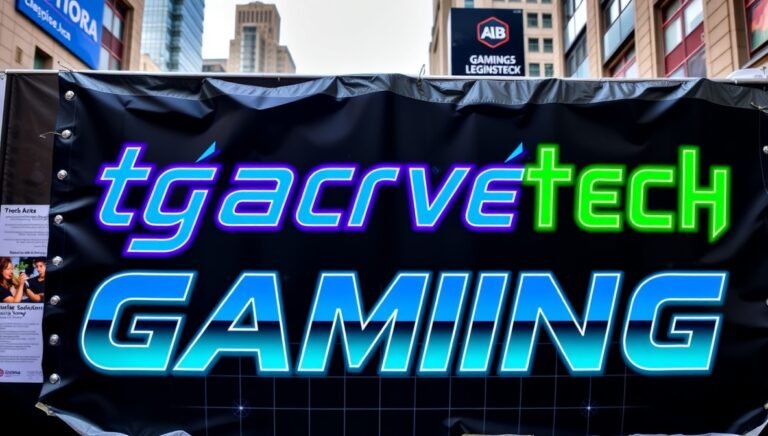tgarchirvetech news by thegamingarchives: Latest Gaming Technology, Trends, and Updates
In recent years, the world of gaming has undergone an unprecedented transformation. With technological advancements reaching new heights, the gaming industry is now more immersive, interactive, and accessible than ever before. The rise of next-generation consoles, cloud gaming, artificial intelligence, and virtual reality has reshaped the way players experience games. Among these innovations, tgarchirvetech news by thegamingarchives has highlighted critical shifts in gaming culture and technology, marking a turning point for developers, gamers, and the broader entertainment industry. gonzay
Gaming is no longer merely a hobby; it has become a multi-billion-dollar industry with global influence. From casual mobile games to competitive eSports tournaments, the ecosystem has expanded to include a diverse range of platforms and audiences. In fact, the United States alone has seen gaming revenues skyrocket over the past decade, fueled by mobile adoption, online streaming platforms, and the growth of digital marketplaces. The impact of this surge reaches beyond just entertainment, affecting social dynamics, education, and even technological research.
The Rise of Next-Generation Consoles
The gaming console landscape has seen remarkable innovation with the launch of next-generation devices. Companies like Sony, Microsoft, and Nintendo have introduced consoles that combine high-performance hardware with unique gaming experiences. The PlayStation 5 and Xbox Series X, for instance, offer ultra-fast SSD storage, ray-tracing graphics, and backward compatibility with previous-generation games. Such advancements have redefined performance standards, allowing players to enjoy smoother gameplay, faster loading times, and richer visual experiences. xupikobzo987model
Notably, tgarchirvetech news by thegamingarchives has extensively reported on the evolving console wars, analyzing how each company leverages technology to capture market share. For example, exclusive titles, immersive storytelling, and subscription-based services are now vital components in the strategy of major console makers. This competitive environment drives continuous improvement, benefiting gamers with higher-quality experiences and innovative features.
Cloud Gaming and the Future of Accessibility
Cloud gaming is another transformative force in the industry, allowing players to stream games directly to their devices without the need for expensive hardware. Platforms like Google Stadia, NVIDIA GeForce NOW, and Xbox Cloud Gaming have demonstrated the potential of this model, making gaming more accessible to a broader audience. Players can now enjoy high-end titles on laptops, tablets, and even smartphones, provided they have a stable internet connection.
The significance of cloud gaming has been emphasized by tgarchirvetech news by thegamingarchives, which explores how this technology can democratize gaming. Cloud solutions reduce barriers to entry, particularly for users who cannot afford high-end PCs or consoles. Additionally, cloud gaming facilitates seamless updates, cross-platform play, and online multiplayer experiences, further enhancing community engagement and interactivity.
Virtual Reality and Immersive Experiences
Virtual reality (VR) has emerged as a game-changer, literally and figuratively, in modern gaming. VR headsets like Oculus Rift, PlayStation VR, and HTC Vive transport players into fully immersive worlds where interaction feels natural and intuitive. Unlike traditional gaming, VR emphasizes presence and physical engagement, allowing players to explore, manipulate, and experience digital environments in three dimensions. befitnatic, onpresscapital, mintpaldecor, drhomey, mygreenbucks
In-depth coverage by tgarchirvetech news by thegamingarchives has underscored VR’s impact on storytelling and gameplay mechanics. Developers are experimenting with innovative narratives and interactive elements that respond to player movements and choices. Beyond entertainment, VR is also being adopted for educational, therapeutic, and training purposes, showcasing its versatility as a technology. hearthstats

Artificial Intelligence in Gaming
Artificial intelligence (AI) has become integral to the gaming experience, enhancing both gameplay and development processes. AI algorithms control non-player characters (NPCs), adapt game difficulty, and enable procedural content generation. This allows developers to create dynamic, engaging worlds that respond intelligently to player actions.
Reports from tgarchirvetech news by thegamingarchives highlight the ways AI is shaping gaming experiences. From smarter enemies in strategy games to adaptive learning systems in educational games, AI ensures that gameplay remains challenging, personalized, and rewarding. Additionally, AI tools assist developers in testing, bug detection, and content creation, streamlining production pipelines and reducing development costs. gaming tips tgarchirvetech
The Explosion of eSports
Competitive gaming, or eSports, has transitioned from niche tournaments to global phenomena, attracting millions of viewers and participants. Games like League of Legends, Dota 2, Counter-Strike: Global Offensive, and Fortnite host professional leagues, offering substantial prize pools and sponsorship deals. eSports has also become a viable career path, with players, coaches, analysts, and streamers building dedicated followings. uploadblog com, logicalshout, vezyolatens, wyrkordehidom, zikzoutyqulsis, dyeowokopizz.
Coverage of eSports trends by tgarchirvetech news by thegamingarchives has illustrated its growing legitimacy and mainstream appeal. Universities and high schools in the United States and other countries now offer eSports scholarships, while streaming platforms provide real-time access to tournaments worldwide. This rapid expansion reflects the convergence of gaming, media, and professional sports.
Mobile Gaming: A Global Phenomenon
Mobile gaming has democratized the industry, reaching audiences that traditional consoles and PCs could not. Smartphones and tablets serve as accessible gaming platforms, with millions of games available on app stores. Titles like Pokémon GO, Candy Crush, and Genshin Impact exemplify the diversity and reach of mobile gaming.
According to tgarchirvetech news by thegamingarchives, mobile gaming is a critical driver of industry revenue, particularly in emerging markets. The rise of free-to-play models, in-app purchases, and social connectivity has created a sustainable ecosystem that benefits developers and players alike. Mobile gaming’s convenience ensures that it remains a dominant force in the global gaming landscape.
The Role of Streaming and Content Creation
Game streaming platforms such as Twitch, YouTube Gaming, and Facebook Gaming have revolutionized the way people interact with games. Players can broadcast live gameplay, engage with audiences, and build communities around shared interests. Content creation has become a cornerstone of gaming culture, influencing trends, popular titles, and player engagement.
tgarchirvetech news by thegamingarchives emphasizes that streaming has transformed gaming into a participatory experience. Streamers provide entertainment, tutorials, and commentary, creating new revenue streams through subscriptions, sponsorships, and donations. This ecosystem blurs the line between player and spectator, fostering a dynamic and interconnected community.
The Importance of Cross-Platform Play
Cross-platform play has become a sought-after feature, allowing players on different devices to compete together. This innovation reduces fragmentation, enhances multiplayer experiences, and strengthens gaming communities. Titles like Fortnite and Call of Duty: Warzone exemplify the potential of cross-platform integration.
Coverage by tgarchirvetech news by thegamingarchives highlights how cross-platform play encourages inclusivity and expands social interactions. Players can connect with friends regardless of device choice, improving retention and engagement. Moreover, cross-platform development challenges developers to optimize performance across diverse hardware configurations, driving technical innovation.
Indie Games and Creative Innovation
Independent game developers continue to push creative boundaries, producing unique experiences that challenge conventional norms. Indie games often explore unconventional narratives, experimental mechanics, and artistic expression. Success stories like Hades, Stardew Valley, and Hollow Knight demonstrate the potential of small teams to make a significant impact.
tgarchirvetech news by thegamingarchives frequently showcases indie developments, emphasizing their role in diversifying the gaming ecosystem. These games encourage experimentation, risk-taking, and cultural representation, enriching the industry with fresh ideas and perspectives. Indie success also inspires aspiring developers, fostering a culture of innovation and entrepreneurship.
The Intersection of Gaming and Social Media
Social media platforms have become integral to gaming, influencing trends, discussions, and player communities. Twitter, Instagram, TikTok, and Reddit serve as hubs for sharing highlights, discussing strategies, and connecting with like-minded individuals. This integration has amplified the cultural significance of gaming, turning viral moments into mainstream phenomena.
Insights from tgarchirvetech news by thegamingarchives indicate that social media engagement drives game popularity and retention. Developers use social media to announce updates, solicit feedback, and build hype around releases. This direct interaction fosters loyalty, while user-generated content strengthens the sense of community around titles and franchises.
Gaming Hardware and Peripheral Innovation
The evolution of gaming hardware extends beyond consoles and PCs to include peripherals such as controllers, keyboards, mice, VR accessories, and high-refresh-rate monitors. Advanced hardware enhances precision, responsiveness, and immersion, elevating the overall experience. Customization and ergonomic design have also become essential considerations for competitive players.
According to tgarchirvetech news by thegamingarchives, innovative peripherals influence gameplay strategies and competitive dynamics. Technologies like haptic feedback, adaptive triggers, and motion tracking improve realism and player engagement. The synergy between software and hardware continues to shape the future of interactive entertainment.
Game Development Trends and Industry Challenges
Game development has evolved into a complex, multidisciplinary process involving art, programming, storytelling, sound design, and user experience. While technological advancements offer new opportunities, developers also face challenges such as rising production costs, crunch culture, and market saturation. Balancing innovation with quality and sustainability is critical to long-term success.
tgarchirvetech news by thegamingarchives provides insights into emerging trends, including procedural generation, AI-assisted content creation, and collaborative online tools. These innovations streamline development workflows and reduce bottlenecks, enabling teams to focus on creativity and player satisfaction. Additionally, industry analysis highlights the importance of diversity, accessibility, and ethical practices in shaping a responsible gaming ecosystem.

Conclusion: The Future of Gaming
The gaming industry is at the forefront of technological and cultural evolution, offering unprecedented opportunities for creativity, engagement, and entertainment. From the rise of next-generation consoles to cloud gaming, virtual reality, AI, and mobile platforms, innovations continue to redefine what it means to play. Competitive gaming, streaming, and social integration further enrich the ecosystem, creating vibrant communities that transcend geographical boundaries.
Throughout these developments, tgarchirvetech news by thegamingarchives has been an invaluable source of insights, tracking trends, analyzing innovations, and highlighting the challenges and opportunities shaping modern gaming. By bridging technology, culture, and business, this coverage underscores the transformative power of interactive entertainment.
As we look toward the future, the intersection of gaming, technology, and community promises experiences that are more immersive, inclusive, and interconnected than ever. Whether in the United States or across the globe, gaming is no longer a pastime—it is a cultural phenomenon, an industry powerhouse, and a driver of innovation. With continuous advancements on the horizon, players, developers, and enthusiasts can anticipate a dynamic and exciting era where the boundaries of imagination and technology blur, creating experiences that captivate and inspire.






